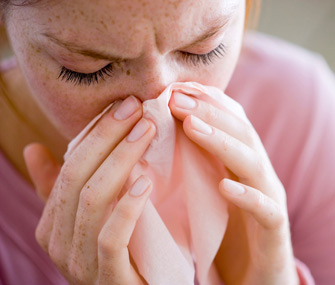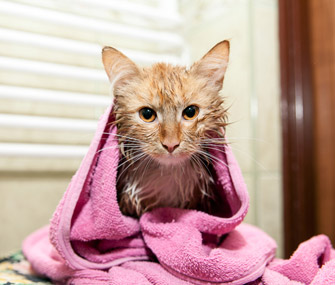Help! I’m Allergic to My Pet
Published on February 06, 2017
Skip To

“Well," the allergist replied,"you’re my veterinarian, so we’re going to figure this out."
That’s right. My colleague, Dr. Primm, is one of approximately 36 percent of veterinary professionals — veterinarians and staff — who are allergic to their patients. And many of our clients are in the same fix: allergic to the animals they love.
Coping With Pet Allergies
Some 50 million people in the United States suffer from
nasal allergies, according to the Asthma and Allergy Foundation of America.
Allergies affect up to 30 percent of adults and 40 percent of children.
Of people with allergies, approximately 30 percent are allergic to pets.
Whether they’re furry or hairless, wirecoated or single-coated, all
dogs and cats produce saliva, urine and dander (dead skin flakes) that
carry the allergens causing sufferers to sniffle, sneeze and wheeze.
Allergies to cats are about twice as common as allergies to dogs.Take Shannon Gillespie of Long Beach, California. She’s allergic to cats, horses and guinea pigs. Fortunately, she doesn’t react to dogs, which is good since she has four of them.
“I get allergy shots to be around other people with horses and cats, and I avoid guinea pigs since that’s easy,” she says. “But I have to make sure I don’t touch a cat. I’m on a ton of meds for asthma, but I sometimes take Benadryl, too.”
Fortunately for Shannon and others like her, the solution is not automatically to get rid of their pets. Allergists used to make that recommendation in almost every case, but many — including Dr. Primm’s allergist — are pet lovers themselves and are sympathetic to their patients’ situations. They’ve learned to help owners make accommodations that allow allergic pet owners to live reasonably comfortably with their dogs and cats.
Keep the Pets, Lose the Itch
Dr. Primm’s strategies include showering and washing her hair immediately after coming home from the clinic and changing into fresh clothing that isn’t contaminated with dander. Antihistamines, sinus rinses and nasal sprays help, too.She has also made changes at home to keep certain spaces allergen-free. Her dog and cat have a separate sleeping area, away from her bedroom. “That was where the doctor and I compromised,” she says. “He said, ‘You just can’t sleep with them; you’ll be sick all the time.’”
Environmental management is one strategy, but it’s not the only option. Allergy shots can help, too. They don’t actually desensitize people to pet allergens, but they can help the body become more tolerant of them.
“Allergies are all the way down at the genetic level," says Oren P. Schaefer, M.D., an allergist at Mass Lung & Allergy in Worcester, Massachusetts Allergy shots, he explains, don’t cure the allergy — instead, they "make you immune-tolerant, so the cat that comes by you doesn’t stir up as much immunologic trouble.”
How well allergy shots work may depend on your level of exposure to pets. Some people respond well to them and are able to comfortably spend time with their animals. Dr. Primm says hyposensitization injections helped her a great deal at first, but because of her overwhelming exposure to animals, they eventually were no longer effective. Nonetheless, for moderate to severe allergies, it’s always a good idea to talk to a board-certified allergist about the possible benefits of allergy shots.

Other Tips And Tricks
Some simple changes to your routine and environment can also help manage pet allergies. Here are some things to try.- Bathe your pet regularly. Most pet shampoos are mild, and weekly bathing usually won’t dry out a dog or cat’s skin. If you can’t manage frequent bathing, use pet wipes to help remove the dander and saliva on a pet’s coat. These can be an especially good choice for cat owners.
- I like to recommend that people put a pet T-shirt or sweater on a dog or cat. It helps to keep dander contained. If possible, have another family member put on and remove the petwear.
- Shower and wash your hair or change your clothes as soon as possible after contact with a pet.
- Keep your pet out of your bedroom or at least out of your bed. Close contact over a period of several hours can cause allergies to flare.
- Vacuum your vehicle and wipe down the seats after your pet has ridden in it. Better yet, have another family member do it to reduce your exposure to allergens.
- At the veterinary clinic, wait in the lobby or outdoors while your pet is examined so you aren’t trapped in a small room filled with allergens.
- Talk to your allergist about medications that can help. Over-the-counter and prescription medications are available. Many people use a combination of products.
- Don’t be afraid to seek the help of a board-certified allergist. Many are understanding about your love for a dog or cat and will do their best to help you live more comfortably with your best friend.
- 8 Ways to Prepare for Guests With Cat and Dog Allergies
- Is it OK to Kiss Your Dog?
- 8 Ways Your Pet Can Help Relieve Your Stress
- Am I a Bad Pet Owner if I Never Wash His Bed?
- Keep Pets Away From These Common OTC Supplements

